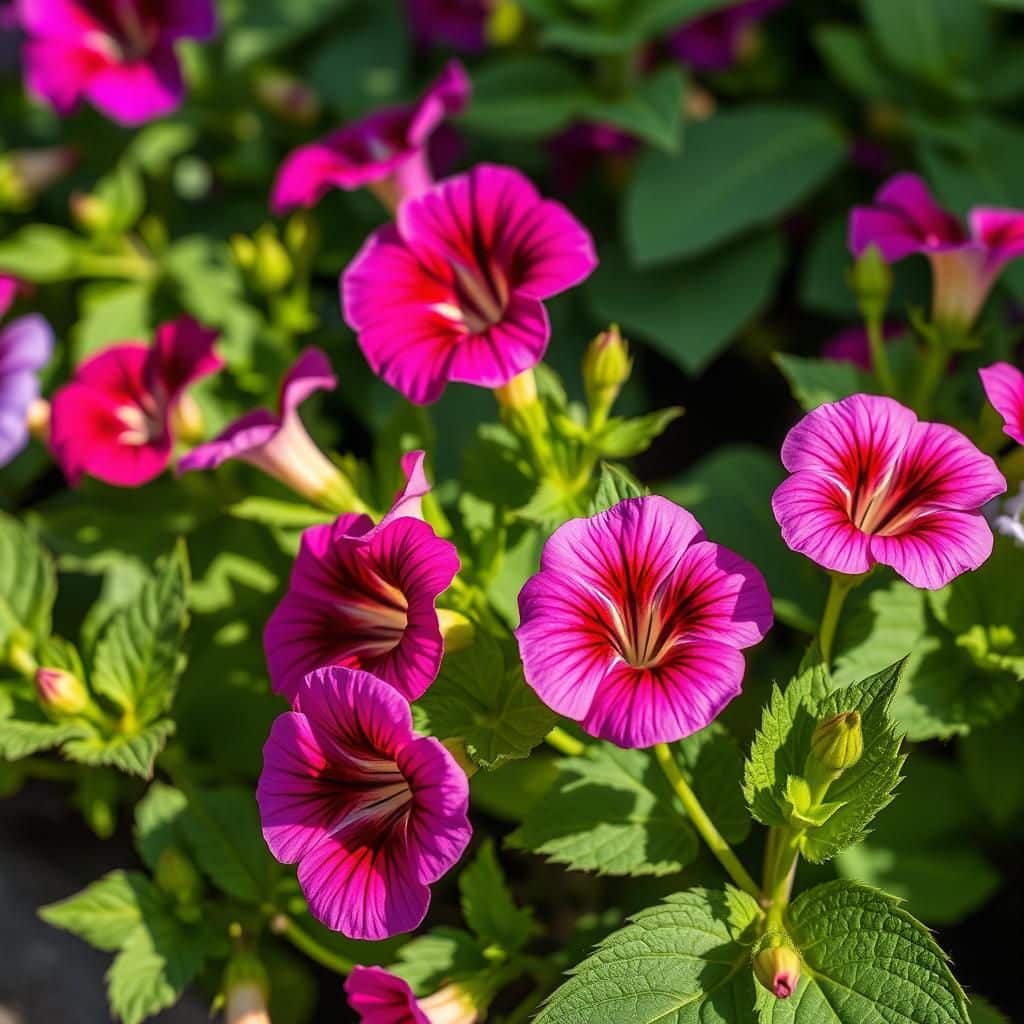Do Petunias Like Sun or Shade? Discover the Best Growing Conditions for Your Petunias

Petunias are beloved for their vibrant colors and delightful fragrance, making them a favorite among gardeners. However, to ensure these beautiful flowers thrive, it's essential to understand their growing conditions. One of the most common questions is whether petunias prefer sun or shade. This article will explore the ideal light requirements for petunias, helping you create a flourishing garden. From sunlight exposure to soil quality, we will uncover the best practices for nurturing these stunning blossoms. Discover how to provide the perfect environment for your petunias and enjoy their brilliant display throughout the growing season.
Do Petunias Prefer Sun or Shade?
Petunias are well-known for their vibrant colors and abundant blooms, and they thrive best in full sunlight. Ideally, these flowers require at least 6 to 8 hours of direct sunlight per day to grow healthy and produce the most impressive displays. While they can tolerate a bit of shade, especially during the hottest part of the day, too much shade can lead to leggy growth and fewer flowers. Therefore, positioning your petunias in a spot that receives ample sunlight is crucial for optimal growth and flowering.
Benefits of Sunlight for Petunias
Sunlight plays a crucial role in the growth of petunias as it allows them to perform photosynthesis, which is essential for producing the energy they need to thrive. When exposed to adequate sunlight, petunias exhibit stronger stems, healthier foliage, and more vibrant flowers. Healthy exposure to sunlight not only supports their growth but also enhances their ability to resist diseases and pests, making them more resilient in the garden.
Effects of Insufficient Sunlight
When petunias do not receive enough sunlight, their growth may become stunted, leading to weak stems and sparse blooms. Insufficient light can cause petunias to stretch towards sunlight, resulting in a lanky appearance with fewer flowers. Additionally, plants that are not adequately sunlit are more susceptible to diseases and pest infestations because they lack the energy to naturally fend off these threats.
Optimal Light Conditions
To achieve the best results with petunias, it's essential to plant them in well-draining soil that can retain some moisture but does not become waterlogged. Choosing a location that receives full sun—meaning it gets direct sunlight from morning until late afternoon—is ideal. If you live in a region with extremely hot summers, providing some afternoon shade can help protect the petunias from extreme heat while still allowing for significant sunlight exposure.
Types of Petunias and Light Requirements
Different types of petunias may exhibit varying levels of tolerance to sun and shade. Grandiflora petunias generally prefer full sun exposure to achieve the fullest blooms, while Surfinias or trailing petunias can adapt slightly better to partial shade, though they still perform best when given ample sunlight. Understanding the specific variety of petunia you have can help you provide the most appropriate light conditions for thriving growth.
Sun and Watering Needs
While petunias love the sun, it is critical to strike a balance with their watering needs. They require consistent moisture, especially during hot summer months, to prevent wilting. However, over-watering can lead to root rot. Therefore, it's important to judge the soil moisture—keeping it slightly damp but not soggy is key. When planted in sunny areas, checking the soil regularly will help you determine the right amount of water required for happy, healthy petunias.
| Light Requirement | Growth Potential | Flowering | Resilience to Pests |
|---|---|---|---|
| Full Sun | Strong and Healthy | Abundant Blooms | High |
| Partial Shade | Moderate Growth | Fewer Flowers | Moderate |
| Full Shade | Weak Growth | Minimal Blooms | Low |
Can petunias handle hot afternoon sun?

Petunias are popular ornamental plants known for their vibrant colors and long blooming seasons. When it comes to handling hot afternoon sun, petunias generally exhibit certain characteristics that can influence their performance in such conditions.
Sunlight Tolerance: Petunias are typically classified as sun-loving plants, thriving best in full sun conditions. They can indeed handle hot afternoon sun, but certain factors can affect their resilience.
See also:
Watering Needs: One of the crucial aspects of caring for petunias in hot weather is ensuring they are adequately watered. In high temperatures, soil can dry out quickly, requiring more frequent irrigation.
Soil Quality: The quality of the soil plays a significant role in how well petunias can withstand the heat. Well-draining soil can help prevent root rot, which can be exacerbated in hot conditions.
Varietal Differences: Different varieties of petunias may have varying tolerances to heat. Some may be more resilient than others, which can influence your choice when planting.
Mulching Benefits: Applying mulch around petunias can help retain moisture and regulate soil temperature, which is beneficial in extremely sunny and hot environments.
Sunlight Tolerance
Petunias thrive in full sun, making them well-suited for sunny gardens. They require at least 6 to 8 hours of sunlight per day to flourish. In hot afternoon sun, they can continue to bloom vibrantly but may need additional care during peak heat.
- Petunias prefer full sun exposure.
- They can withstand high temperatures but may show signs of stress.
- Providing some afternoon shade can help protect them during extreme heat.
Watering Needs
Proper watering is essential for petunias, especially under hot conditions. During the warmest parts of the day, the combination of heat and wind can dehydrate petunias quickly. Regular watering can ensure they remain hydrated and healthy.
- Water petunias deeply in the morning or late afternoon.
- Avoid overhead watering to reduce the risk of diseases.
- Check soil moisture frequently to adjust watering accordingly.
Soil Quality
The type and quality of soil can significantly affect how petunias handle the heat. Well-draining soil helps maintain moisture levels while preventing root damage. Adding organic matter can improve soil structure and water retention.
- Use potting mix or garden soil that drains well.
- Add compost to enrich the soil.
- Avoid compacted soil that retains excessive moisture.
Varietal Differences
There are various petunia hybrids, each with different heat tolerance levels. Some may be bred specifically for extreme weather conditions, making them better suited for hot environments. Understanding these differences can guide your planting choices.
- Research varietals for heat resilience.
- Look for terms like “heat-tolerant” or “weather-resistant.”
- Consider local climate when selecting a variety.
Mulching Benefits
Applying a layer of mulch around petunias offers numerous advantages, particularly in hot conditions. Mulch can help retain soil moisture, keep root temperatures lower, and suppress weed growth.
- Use organic mulch like wood chips or straw.
- Apply a 2-3 inch layer around plants.
- Refresh mulch regularly to maintain effectiveness.
What not to plant near petunias?


Petunias are beautiful and vibrant flowers that can enhance any garden, but certain plants can negatively affect their growth and health. It's crucial to know what not to plant near petunias to prevent competition for nutrients, water, and light as well as to minimize pest and disease susceptibility. Below are key plants and factors to avoid when planning your garden layout around petunias.
1. Plants that Attract Pests
Certain plants can draw unwanted pests that affect petunias, such as aphids and spider mites. Avoid planting the following near petunias:
- Marigolds: While marigolds are often praised for their pest-repelling qualities, they can attract spider mites that specifically target petunias.
- Cucumbers: These plants can bring aphids into your garden, which may spread to your petunias and cause significant damage.
- Potatoes: This crop not only competes for nutrients but can also attract pests that spread to nearby petunias.
2. Heavy Feeders
Heavy feeders consume a large amount of nutrients from the soil, which can impair the growth of petunias. It is advisable to avoid planting the following:
- Corn: Known for its nutrient demands, corn can deplete the soil, leaving petunias struggling for sustenance.
- Tomatoes: This popular garden plant competes vigorously for nutrients and can hinder the growth of nearby petunias.
- Squash: Like tomatoes, squash has high nutrient requirements that can adversely affect petunias' growth.
3. Plants that Prefer High Humidity
Petunias thrive in dry to moderate conditions, while some plants prefer a more humid environment. Avoid these plants:
- Ferns: They require high moisture levels, which can create a damp environment unsuitable for petunias.
- Hostas: These shade-loving plants thrive in moisture and can compete with petunias for space and water.
- Impatiens: Often grown in shady areas with high humidity, they can create unfavorable conditions for petunias.
4. Perennial Plants
While petunias are annuals, perennials can compete over multiple growing seasons. It is best to keep them apart:
- Rudbeckia: These hardy perennial flowers can overtake petunias, leading to overshadowing and competition for resources.
- Daylilies: Known for their aggressive growth, daylilies can outcompete petunias for nutrients and sunlight.
- Lavender: While they may seem compatible at first, lavenders can grow excessively, limiting the growth potential of petunias.
5. Plants with Similar Diseases
Some plants are predisposed to diseases that can also affect petunias. It is wise to avoid planting:
- Snapdragons: These flowers can share diseases like root rot, which may quickly spread to petunias.
- Phlox: Phlox is also susceptible to common petunia diseases, making them suitable neighbors for spreading viruses.
- Salvia: Known for attracting pests, salvia can inadvertently lead to disease transmission to nearby petunias.
Questions from Our Readers
Do petunias prefer full sun or partial shade?
Petunias thrive best in full sun, meaning they need at least six hours of direct sunlight each day. While they can tolerate some partial shade, their growth and flowering are significantly improved when exposed to the sun’s rays.
What happens if petunias are planted in the shade?
If petunias are planted in shade, they may become leggy and produce fewer flowers. The lack of adequate sunlight affects their overall health, resulting in a weaker plant that is more susceptible to disease and does not display the vibrant colors they are known for.
Can petunias survive in hot, sunny conditions?
Yes, petunias can not only survive but thrive in hot, sunny conditions. They are heat-tolerant plants that prefer warmer temperatures, making them an excellent choice for summer gardens, as long as they also receive ample water.
How should petunias be cared for in sunny areas?
To care for petunias in sunny areas, ensure they are planted in well-draining soil and receive regular watering to prevent them from drying out. Additionally, applying a balanced fertilizer every few weeks can promote healthy growth and abundant flowering.
See also:

If you want to read more articles like Do Petunias Like Sun or Shade? Discover the Best Growing Conditions for Your Petunias, we recommend you check out our Flowers category.
Leave a Reply
Related Articles